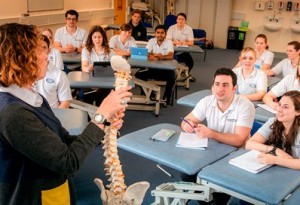I have just recently completed my BSc (Hons) Physiotherapy degree at King’s College London and have recently been successful in applying for a Band 5 rotational job at my local NHS trust.
Before I began my physiotherapy journey as a mature student I scoured the internet looking for information about what to expect and the challenges laying ahead of me. However, after trawling through numerous forums and old blogs I was unable to find the information I felt I needed.
Therefore, as a recent graduate and someone who is about to embark on my physiotherapy career, I wanted to provide information for those who have recently been successful in applying to their chosen university. I hope over the next few months it will provide an insight in what to expect throughout your degree and add to the excitement of beginning your journey.
Choice of University
One thing I did notice from speaking to fellow students is that universities very much differ in what they teach and how they teach it. Some are more practical than others while others are more theory based – the end goal is the same however the journey is very different.
much differ in what they teach and how they teach it. Some are more practical than others while others are more theory based – the end goal is the same however the journey is very different.
University is very different to college! Yes, you will have lectures and yes, the lecturers will be there to answer any questions you may have. BUT, once the practical has been completed or the lecture has finished, the onus is very much on you to reinforce that learning or book a room to perform go over practical sessions with peers.
Keep up with the workload!
As you may have already been told, this is a very intensive course. Workload and information will come at you quickly and the learning is fast paced. The BIGGEST piece of advice I can offer is keep on top of your workload and notes. As soon as you start to get behind it is very difficult to keep up so set yourself a plan of what you want to have achieved and keep track of it. This goes throughout the whole of your academic experience.
And as it such an intensive course you will get stressed! Everyone does! The workload, the placements, the written exams, the practical exams – it gets to absolutely everyone and there may be times you think that you can’t do it and it’s not for you. This is totally normal, I was there! The amount of people I have spoken to who were qualified who said that they felt exactly the same as me. If things get tough, don’t be afraid to speak to someone; friends, lecturers, your tutor – they are there to help.
Anatomy, anatomy, anatomy!
 As physios, this is our thing! We are experts within anatomy & physiology and it is our job to assess and help our patients with a well-considered hypothesis. Therefore, we REALLY must know our anatomy and be confident with our knowledge. Yes, you will have lectures around this but it is important that this is embraced within your own personal study time. There are some great resources out there for all manners of different learners. Get a group of friends together to practice anatomy Q&A. The sooner you have a good understanding of this it will help with your clinical reasoning at a much earlier stage of your degree.
As physios, this is our thing! We are experts within anatomy & physiology and it is our job to assess and help our patients with a well-considered hypothesis. Therefore, we REALLY must know our anatomy and be confident with our knowledge. Yes, you will have lectures around this but it is important that this is embraced within your own personal study time. There are some great resources out there for all manners of different learners. Get a group of friends together to practice anatomy Q&A. The sooner you have a good understanding of this it will help with your clinical reasoning at a much earlier stage of your degree.
Practical Sessions
These are great! You will have a number of these sessions throughout your degree and it’s a chance to really get hands on and learn about examination techniques. The only difficulty is that within your peer group no-one usually has an injury and movements are pain free! BUT, the second biggest piece of advice I can give you is that when you practicing these techniques, what structures are you testing? If someone has got restricted movement, what structures may be at fault? What could be your differential diagnosis? What could you do to test that hypothesis? Really start to think about this as this forms the basis of clinical reasoning and is extremely important when examining patients, formulating problem lists and treatment plans when on placement. If you can start this thought process early in your degree then this will 100% help you on placements and will give you a head start. Do not just perform an examination technique for the sake of it. Think! Why am I doing this? What am I testing?
Evidence Based Practice
As health care professionals we have to ensure that the treatments we offer our patients are based on the latest clinical evidence. Universities will usually cover this at some point throughout your degree however try to acquaint yourself with evidence early on. Have a look at some NICE guidelines and familiarise yourself with their findings. What do they say? Have a look at a recent research paper in an area you are interested in. Get a general feel for the paper, the layout, structure and format. It will help for later in your degree if you get a basic understanding of a clinical paper.
Student CSP Membership
The Chartered Society of Physiotherapy (CSP) is our professional body and while joining it as a student is not compulsory, I found it extremely beneficial. Being a member allows access to information through their website, the monthly ‘Frontline’ magazine that provides you the latest information regarding our profession, latest evidence and courses around the country for the various specialities as well as a discount when you register as a qualified physiotherapist.
Continual Professional Development (CPD) Folder
Upon successfully completing your degree you will have to register with the Health Care Professions Council. As health care professionals, and in particular autonomous professionals, we have to show that we can think and reflect upon our practice, stay up to date with evidence and also proactive in facilitating our own learning. Once graduated and working, you MAY get asked by the HCPC to provide a CPD folder highlighting your ability to keep your practice up to date. My university emphasied the importance of starting a CPD folder early on and I echo this advice to you. Purchase a presentation folder and documents such as personal reflection, CPD events / lectures, anything that highlights that you have independently seeked to improve your own practice. This should be added to over the three years which will eventually form a fantastic base for when you finally start working.
Exams
This will be covered in a later blog, and again universities operate differently from one another. My experience of exams comprised of written exams, presentations, practical exams (OSCE’s), placements, reflective pieces, assignments, critical appraisal of papers and a final year dissertation.
Have fun!
Yes, it’s a tough course, and yes things will be stressful. But this course is so rewarding, particularly when you start to go on placement and things start to click. You are entering a career which is so diverse, you get to meet some amazing people and there are some exciting times ahead for our profession. Enjoy your physiotherapy experience, I can promise you it will fly!
Next month I will offer some advice around resources that helped me throughout my degree; from books, websites and flash cards. See you next time!